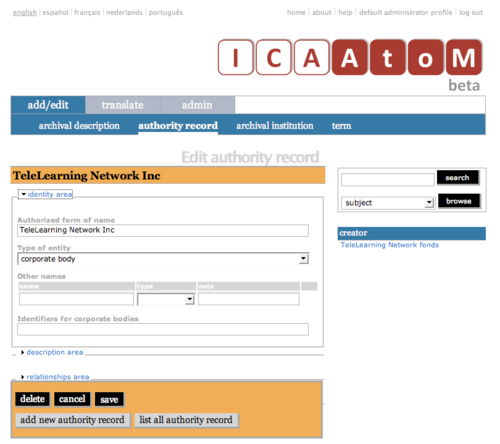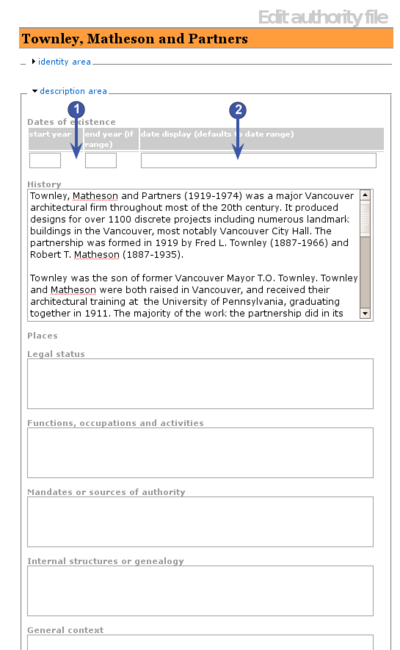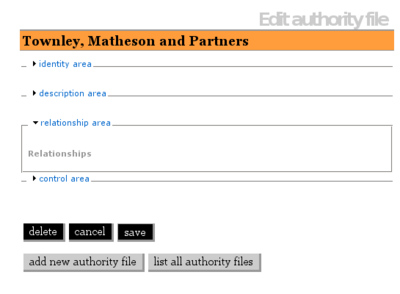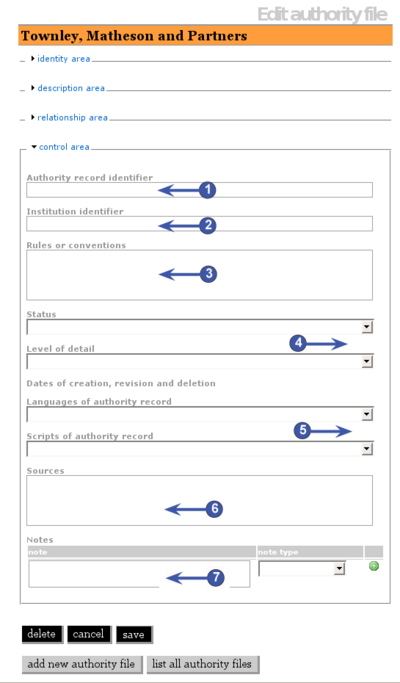Difference between revisions of "Add a new authority record"
| Line 20: | Line 20: | ||
| − | 1. | + | 1. '''Authorized form of name''' ([[RS-2#5.1.2|ISAAR(CPF) 5.1.2]]): |
*Enter the name that uniquely identifies the entity. | *Enter the name that uniquely identifies the entity. | ||
*Drop-down lists of names that appear throughout the system are generated from the values entered in this field. | *Drop-down lists of names that appear throughout the system are generated from the values entered in this field. | ||
| − | 2. | + | 2. '''Type of entity''' ([[RS-2#5.1.1|ISAAR(CPF) 5.1.1]]): |
| − | *Select | + | *Select the type of entity. |
| + | *ICA-AtoM ships with a default value list ([[Glossary#Taxonomy|taxonomy]]): ''Corporate body, Person or Family''. | ||
| − | 3. | + | 3. '''Other names''' ([[RS-2#5.1.3|ISAAR(CPF) 5.1.3]], [[RS-2#5.1.4|ISSAR(CPF) 5.1.4]], [[RS-2#5.1.5|ISAAR(CPF) 5.1.5]]): |
| − | *Multi-value | + | *[[Glossary#Multi-value list|Multi-value list]] displaying alternate names for the entity. |
*Register as many names as you need. | *Register as many names as you need. | ||
*The last row in the list contains text boxes for data entry. | *The last row in the list contains text boxes for data entry. | ||
| − | * | + | *Enter the alternate name in the "Name" field, select the "Type of name" from the drop-down list, and add any explanatory text if required in the "Note" field. |
| + | *When you save the record, ICA-AtoM registers the other name and displays it in the list above the data entry field. | ||
| + | *To delete an entry, click the [[Glossary#Delete icon|Delete icon]]. | ||
| − | 4. | + | 4. '''Identifiers for corporate bodies''' ([[RS-2#5.1.6 |ISAAR(CPF) 5.1.6]]): |
| − | |||
| − | |||
| − | |||
| − | |||
| − | |||
| − | |||
| − | |||
| − | |||
| − | |||
| − | |||
| − | |||
| − | |||
| − | |||
| − | |||
| − | |||
| − | |||
| − | |||
| − | |||
| − | |||
| − | |||
| − | |||
| − | |||
| − | |||
*Enter numbers or other identifiers that were used to identify the corporate body in a specific jurisdiction (e.g. registered company number). | *Enter numbers or other identifiers that were used to identify the corporate body in a specific jurisdiction (e.g. registered company number). | ||
| − | *Do not confuse with the | + | *Do not confuse with the "Authority record identifier" assigned by the archival institution as a unique identifier of the authority record in the "Description control area" (see [[UM-3.4|Data entry: description control area]]). |
| − | |||
| − | |||
| − | |||
| − | |||
| − | [[ | ||
| − | |||
| − | |||
| − | |||
| − | |||
| − | |||
| − | + | == Description area == | |
| − | |||
| − | The | + | The "Description area" contains fields that for information "about the nature, context and activities of the entity being described" (ISAAR(CPF) 4.4.2). With the exception of date-related fields (see steps 1-3 below), all fields are basic text fields. For practical purposes there are no limits on length in text fields (fields can hold up 16 million characters); scroll arrows will appear if needed. |
Revision as of 14:33, 2 June 2008
Please note that ICA-AtoM is no longer actively supported by Artefactual Systems.
Visit https://www.accesstomemory.org for information about AtoM, the currently supported version.
Add / edit authority records
Main Page > User manual (UM) > UM-3 Add / edit content > UM-3.2 Add / edit authority records
Overview
The Edit screen for authority records is structured into four areas of description based on ISAAR(CPF)'s "information areas". Click on a area of description to expand it (display fields); click again to collapse it (hide fields). Note that as of ICA-AtoM version 0.6, whenever you save a record ICA-AtoM re-loads the page, collapsing all areas.
The following notes aim only to clarify ICA-AtoM procedures; for guidelines on what information to record in particular fields, consult ISAAR(CPF) as the content standard. The notes are organized by field, with links to the applicable ISAAR(CPF) section(s).
Identity area
The "Identity area" contains fields for information "which uniquely identifies the entity being described and which defines standardized access points for the record" (ISAAR(CPF) 4.4.1).
1. Authorized form of name (ISAAR(CPF) 5.1.2):
- Enter the name that uniquely identifies the entity.
- Drop-down lists of names that appear throughout the system are generated from the values entered in this field.
2. Type of entity (ISAAR(CPF) 5.1.1):
- Select the type of entity.
- ICA-AtoM ships with a default value list (taxonomy): Corporate body, Person or Family.
3. Other names (ISAAR(CPF) 5.1.3, ISSAR(CPF) 5.1.4, ISAAR(CPF) 5.1.5):
- Multi-value list displaying alternate names for the entity.
- Register as many names as you need.
- The last row in the list contains text boxes for data entry.
- Enter the alternate name in the "Name" field, select the "Type of name" from the drop-down list, and add any explanatory text if required in the "Note" field.
- When you save the record, ICA-AtoM registers the other name and displays it in the list above the data entry field.
- To delete an entry, click the Delete icon.
4. Identifiers for corporate bodies (ISAAR(CPF) 5.1.6):
- Enter numbers or other identifiers that were used to identify the corporate body in a specific jurisdiction (e.g. registered company number).
- Do not confuse with the "Authority record identifier" assigned by the archival institution as a unique identifier of the authority record in the "Description control area" (see Data entry: description control area).
Description area
The "Description area" contains fields that for information "about the nature, context and activities of the entity being described" (ISAAR(CPF) 4.4.2). With the exception of date-related fields (see steps 1-3 below), all fields are basic text fields. For practical purposes there are no limits on length in text fields (fields can hold up 16 million characters); scroll arrows will appear if needed.
1. Start year and End year: (ISAAR(CPF) 5.2.1):
- Enter the start and end years.
- For corporate bodies: years of establishment and dissolution.
- For persons: birth and death year.
- Leave end year blank if the entity is still in existence.
- Use four-digit numbers only.
- Do not use qualifiers (e.g. "ca.") or typographical symbols (e.g. "[197-]") to express uncertain dates.
- Start and end values will be used in searches (earlier than, later than) and sorting.
2. Date display (ISAAR(CPF) 5.2.1):
- Enter dates of existence as a date range (yearX - yearY).
- Add qualifiers (e.g. "ca.", "predominant") and typographical symbols if required.
- This is the value that will appear on the View screen as the Dates of existence.
3. The remaining fields in this area are basic text fields. See ISAAR(CPF) for guidelines:
- ISAAR(CPF) 5.2.2: History
- ISAAR(CPF) 5.2.3: Places
- ISAAR(CPF) 5.2.4: Legal status
- ISAAR(CPF) 5.2.5: Functions, occupations and activities
- ISAAR(CPF) 5.2.6: Mandates/Sources of authority
- ISAAR(CPF) 5.2.7: Internal structures/Genealogy
- ISAAR(CPF) 5.2.8: General context
|width="40%" align="right"|
|}
Relationships area
|
The RelationshipsArea contains fields for documenting relationships with other corporate bodies, persons and/or families (ISAAR(CPF) 4.4.3).
|
Control area
|
The ControlArea is "where the authority record is uniquely identified and information is recorded on how, when and by which agency the authority record was created and maintained" (ISAAR(CPF) 4.4.4).
|



